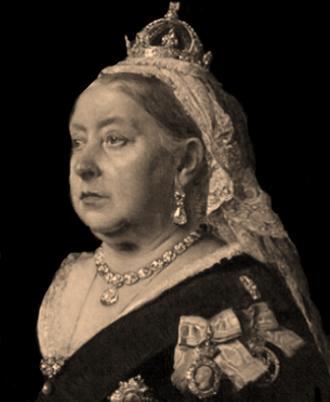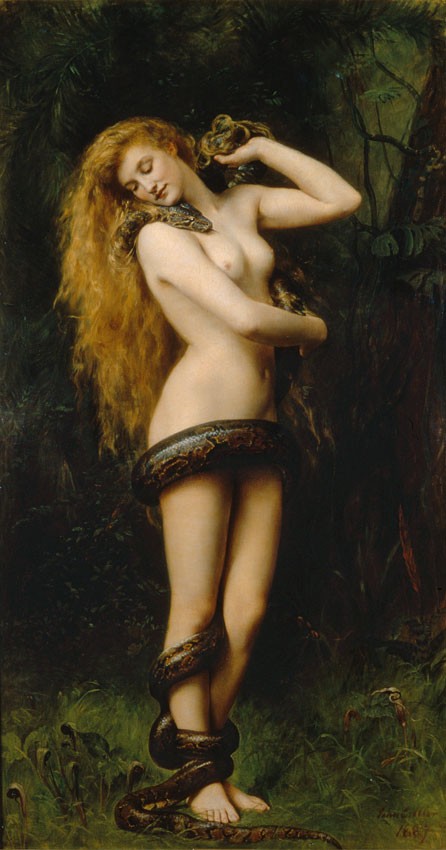by Pax Gutierrez-Neal
Hebrew apocrypha contains the legend of Lilith, the first wife of Adam. She, like Adam, was created from dust and clay. In one version, God first created a single being of dual genders before splitting the human into two halves, creating male and female. Because they were both born from the earth, Lilith saw herself as perfectly equal to Adam in all ways. She demanded that equality. Adam refused. She spoke God’s name, corrupting it by voicing it with her human mouth, and so began her demonic transformation. Wings sprouted, and she flew away from Eden, from God and the half of herself that was Adam.
She abandoned her husband to mate with serpents and spawn demons in the deserts. When she refused to return to Adam, her demonic children were killed, and Eve was made of Adam’s rib. In vengeance for her dead children and in agony over the new union, Lilith murdered the infants of man. The story ends with a final curse from God; Lilith’s transformation is complete, and she becomes a succubus.
Although the Haggadah leaves this part out, The Alphabet of Ben Sira claims that Lilith’s defiance was her refusal to submit to Adam during sex. In this union of two into one, she did not wish to lie beneath him, passive and dutiful.
“Close your eyes and think of England,” Queen Victoria said.
The Queen of England had been addressing women who did not want to have sex, who saw it as dirty and sinful. Procreation was the only acceptable function of man’s physical union with woman; to find pleasure in it was evil.
Do not enjoy sex. Do not be passionate. Do not be a harlot and a whore.
You will have missionary-position sex. You will close your eyes and turn your head away from your husband. You will not find climax.
Faced with this, I am willing to risk being deemed a heretic and say that I understand why Lilith left. Where is love without passion? Where is life?
We do not live in Victorian England, people say. We do not live in a sexually repressed world. They see one extreme and ignore the other; confident in that view of sexual liberty, they turn from the pervasive and persistent idea that the body is a host of sin. And sex is the original sin; it is the knowledge of good and evil, and it is what has damned us all.
But sex is not a sinful, dirty little secret that no one is allowed to talk about. It does not make you damned or unchristian to like sex. Passion has its place in life, as all things do, and I believe it should be reserved for marriage. But even so, sex’s place is not the box in the attic. It is not a rare chore, requiring dust masks and aprons and heavy, resigned sighs. Sex is not martyrdom; sex is passion in its purest expression.
The cost of Lilith’s choice, however, is daunting. She can never be whole again.
In leaving Adam, with whom she was one creature with four legs and four arms and two hearts, two minds, she left behind half of herself.
And Adam, too, is only half a person, and Eve a part of that half. Even together, they are only one half. All of their children are half-people. Half-people who seek other half-people, who marry and create more half-people.
Lilith’s decision doomed mankind to half-dom. Yet she sought out her passion; she went to the serpents in the desert cave and birthed demons by the hundreds. She had her wild, passionate, sinful sex.
And then, with the final curse, she became a demon that sucks the life out of men during sex, one that will rape a male in his sleep if necessary. In the dark, in secret, indiscriminate; she visited man after faceless man, body after body, found her passion over and over.
It is the legacy of Lilith. Half-people seeking love, finding its phantom, and leaving as empty as before. It is the schism created by Lilith when she refused to join with Adam, when she chose passion over unity. When she could not bring herself to close her eyes and turn away, to bear his weight without returning his embrace.
Jesus said that He is the bridegroom, and the church is the bride. A perfect union of Whole and half. When the righteous meet to be whole in Christ, they will eat of Taninim, the slain wife of Leviathan, at the banquet of the Messiah’s advent, and in this communion find themselves no longer half-people. They will be filled by the meat of her flesh as they are filled in the promise of Wholeness.
Yes, it’s a metaphor. No, it’s not to be taken literally.
Still, it resonates in the mind; it echoes down the chasm of Lilith’s choice.
Life is about love; love is meant to be passionate.
And yet how can I write these words without the other form hovering just off the screen? Looming over my shoulder and demanding I shift the terminology. Not passion; the Passion. 
Christ suffered the Passion; I don’t like how that’s phrased. He suffered for us, yes, but to say that one has “suffered” passion? As if it were something only to be endured?
Yet Lilith, too, suffered her passion–her glorious, reckless passion. She is cursed in her unfulfilled love; she is empty. Her passion hollowed itself out, thinning down to the most basic sexual need, one that precludes the vitality of life and love. She sought her passion and lost half of herself; she sought her passion and found in it suffering.
The Passion was about giving life, about expressing ultimate love.
But it was about suffering, as well. How do I reconcile that? How do I merge the bare necessity of passion in life and love with this concept of suffering it? How do I reconcile the burning need, the consuming pleasure of it with this inherent agony? Is passion, is sex, a trial? A test to see how well we can resist it?
It sounds like a cruel trick.
God made sex, and it is good.
Oh, but don’t enjoy it. You’re just a half-person, and sex is only for making miniature half-people. Forget all about this expression of love, this celebration of life; forget all about that incessant, driving need to be one, to be whole. Don’t mind how it makes your body shake, your mind blank, your toes curl. It’s all a test.
And, when Christ comes again and fulfills His bridegroom promise, you won’t have to worry about being a half-person anymore. You’ll be whole again; the legacy of Adam’s first wife will fall away, along with all her sinful ideas of “passion.”
It’s a tempting thought, isn’t it? To know completeness, no matter the cost?
But I don’t understand this concept of mutual exclusivity. Why is there a price, a sacrifice in this choice? If Christ experienced passion for the sake of His love, even if it was a suffering passion, then why are we half-people barred from doing the same? Why can’t we express our love, our life, our sexuality without it being condemned as the sin of the world?
There is no reason, no adequate explanation for our religious genophobia. There is no sin inherent in our passion. There should be no rampant fear of damnation, no either/or decision that leaves you either barren and complete, or hollowed and enthused.
Even free to love her sexuality, Lilith suffered her emptiness. And Adam, so sure in his passionless fulfillment, denied himself and Lilith the most powerful expression of love. Lilith was one extreme, and Adam was another. They are the progenitors of the either/or that pervades our views of sexuality, and Lilith’s choice birthed the rift.
Even so, I wonder if Lilith would have changed her mind, if she would have submitted in order to be whole again. Would she eat of Taninim’s flesh, seated beside Jesus, her eyes downcast?

One Response
An excellent piece. Thank you for sharing.